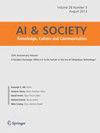来源期刊
期刊介绍:
AI & Society: Knowledge, Culture and Communication, is an International Journal publishing refereed scholarly articles, position papers, debates, short communications, and reviews of books and other publications. Established in 1987, the Journal focuses on societal issues including the design, use, management, and policy of information, communications and new media technologies, with a particular emphasis on cultural, social, cognitive, economic, ethical, and philosophical implications.
AI & Society has a broad scope and is strongly interdisciplinary. We welcome contributions and participation from researchers and practitioners in a variety of fields including information technologies, humanities, social sciences, arts and sciences. This includes broader societal and cultural impacts, for example on governance, security, sustainability, identity, inclusion, working life, corporate and community welfare, and well-being of people. Co-authored articles from diverse disciplines are encouraged.
AI & Society seeks to promote an understanding of the potential, transformative impacts and critical consequences of pervasive technology for societies. Technological innovations, including new sciences such as biotech, nanotech and neuroscience, offer a great potential for societies, but also pose existential risk. Rooted in the human-centred tradition of science and technology, the Journal acts as a catalyst, promoter and facilitator of engagement with diversity of voices and over-the-horizon issues of arts, science, technology and society.
AI & Society expects that, in keeping with the ethos of the journal, submissions should provide a substantial and explicit argument on the societal dimension of research, particularly the benefits, impacts and implications for society. This may include factors such as trust, biases, privacy, reliability, responsibility, and competence of AI systems. Such arguments should be validated by critical comment on current research in this area. Curmudgeon Corner will retain its opinionated ethos.
The journal is in three parts: a) full length scholarly articles; b) strategic ideas, critical reviews and reflections; c) Student Forum is for emerging researchers and new voices to communicate their ongoing research to the wider academic community, mentored by the Journal Advisory Board; Book Reviews and News; Curmudgeon Corner for the opinionated.
Papers in the Original Section may include original papers, which are underpinned by theoretical, methodological, conceptual or philosophical foundations. The Open Forum Section may include strategic ideas, critical reviews and potential implications for society of current research. Network Research Section papers make substantial contributions to theoretical and methodological foundations within societal domains. These will be multi-authored papers that include a summary of the contribution of each author to the paper. Original, Open Forum and Network papers are peer reviewed. The Student Forum Section may include theoretical, methodological, and application orientations of ongoing research including case studies, as well as, contextual action research experiences. Papers in this section are normally single-authored and are also formally reviewed. Curmudgeon Corner is a short opinionated column on trends in technology, arts, science and society, commenting emphatically on issues of concern to the research community and wider society. Normal word length: Original and Network Articles 10k, Open Forum 8k, Student Forum 6k, Curmudgeon 1k. The exception to the co-author limit of Original and Open Forum (4), Network (10), Student (3) and Curmudgeon (2) articles will be considered for their special contributions.
Please do not send your submissions by email but use the "Submit manuscript" button.
NOTE TO AUTHORS: The Journal expects its authors to include, in their submissions:
a) An acknowledgement of the pre-accept/pre-publication versions of their manuscripts on non-commercial and academic sites.
b) Images: obtain permissions from the copyright holder/original sources.
c) Formal permission from their ethics committees when conducting studies with people.
期刊最新文献
Reflexive ecologies of knowledge in the future of AI & Society
The machine in the manuscript: editorial dilemmas
AI, society, and the shadows of our desires
Is Consent-GPT valid? Public attitudes to generative AI use in surgical consent.
Body metaphors in science fiction narratives: a proposal for challenging stereotypes of robots in narrative


